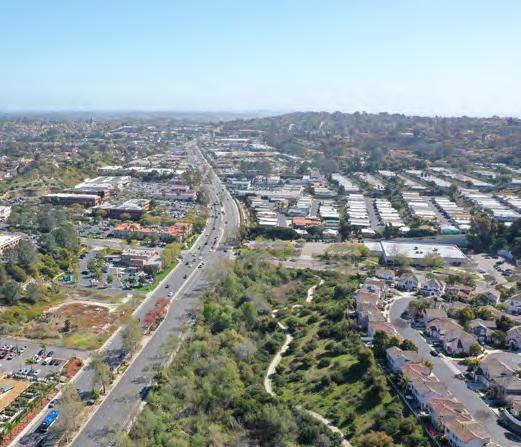
3 minute read
Housing
Welcome Home, Encinitas
The Development Services Department is tasked with implementing the City’s General Plan, Specific Plans and Municipal Code. The department consists of the planning, housing, building, land development engineering, sustainability, coastal management, and code enforcement divisions, which all have varying and pivotal roles in ensuring that new programs and development and long-range policies align with the City’s long-term vision.
Advertisement
HOUSING IN ENCINITAS
On July 13, 2021, the State of California’s Department of Housing and Community Development approved the City’s Sixth Cycle Housing Element (2021–2029). As part of the Housing Element, the City has identified programs and activities to implement over the next four years to identify and address constraints on development as well as affirmatively furthering fair housing opportunities and promoting housing throughout the community for all persons. The Housing Element also identified 14 sites for future housing that would be available to lower income households. One important note is that while the City is mandated by the State of California to have a Housing Element and identify the location of future affordable housing, the City does not build housing, and it will continue to be up to private developers. Since 2021, the City has approved 556 new housing units, 102 of which will be affordable to lower income households.
Housing plan website
ADU PROGRAM
The City’s award-winning Permit Ready Accessory Dwelling Unit (PRADU) program was launched in April 2019, and over the last two years, residents have submitted 293 accessory dwelling unit permits, 40 of which were pre-approved plans provided by the PRADU program. These units, perhaps better known as granny-flats, continue to be an integral part of Encinitas’ housing conversation. encinitasca.gov/adu
EL CAMINO REAL SPECIFIC PLAN
The El Camino Real corridor is the City’s busiest and most vibrant commercial corridor and serves as a major thoroughfare within the community. In the future, the City’s General Plan envisions more connection, and walkable areas throughout the City that support a mixture of land uses, including retail, office and neighborhood-friendly housing in the right locations. The development of a specific plan for the El Camino Real Corridor will provide the necessary development standards to further implement a blueprint for the community. The City has held two community workshops to discuss the vision and proposed land uses for the future of the corridor. The project is expected to be completed in FY 2023–2024.
El Camino Specific Plan
MOBILITY ELEMENT UNDERWAY
In Spring 2021, the City began a project to update its Mobility Element—previously known as the Circulation Element—and create a framework to implement Senate Bill 743 (SB 743), a new state law governing transportation analysis. The City has held two community workshops to discuss the Element’s proposed goals and street network. The project is expected to be completed in FY 2023–2024. Mobility element website
The Mobility Element is a section of the City’s General Plan that identifies a multimodal transportation network to serve the community’s needs. The last comprehensive update to the Mobility Element was in 1989, when the population was lower and transportation options were very different. Since then, Encinitas has grown to nearly 65,000 residents and transportation options continue to expand.
HOMELESSNESS PROGRAMS
During COVID, the State of California saw a rise in the number of individuals experiencing homelessness. Since 2020, the City has been coordinating homelessness response with several entities to provide services across the City.
The Homeless Outreach Program for Empowerment (HOPE) began in 2020 as a partnership between the City, County, Sheriff’s Department and the Community Resource Center to outreach to individuals that are living on our streets. The program has served over 598 individuals and has housed 132.
Another program of note is the Safe Parking Program run by Jewish Family Service that provides individuals living in their vehicles a safe place to park at night where they can receive services. Since 2020 the program has served over 140 individuals, 43% of which have had positive exits to housing or reunification with family.










